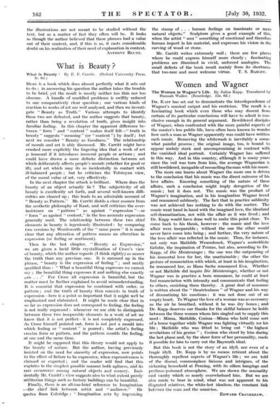Women and Wagner
Da. KAPP has set out to demonstrate the interdependence of Wagner's musical output and his eroticism. The result is a
fascinating book which even those who may dissent from certain of its particular conclusions will have to admit is con- clusive enough in its general argument. Bewildered disciples of Wagner, when confronted with the more painful aspects of the master's less public life, have often been known to wonder how such a man as Wagner apparently was could have written such music. Removing the whitewash is inevitably a some- what painful process ; the original image, too, is bound to
appear unduly stark and uncompromising in contrast with the vanished ideal portrait. Certainly Wagner has suffered in this way. And in this country, although it is many years since the veil was torn from him, the average Wagnerian is still bewildered, incapable of reconciling the man with his music. The more one learns about Wagner the more one is driven to the conclusion that his music was the direct outcome of his love affairs. Knowing something of the nature of these affairs, such a conclusion might imply derogation of the music ; but it does not. The music was the product of Wagner's imagination, and in his imagination Wagner loved and renounced sublimely. The fact that in practice sublimity was not achieved has nothing to do with the matter. The music went hand in hand with the imagined love, the idealized self-dramatization, not with the affair as it was lived ; and Dr. Kapp would have done well to make this point clear. To come back to his thesis, however : the music and the love affair were inseparable ; without the one the other would never have come into being ; and further, the very nature of the love affair was reflected in the music. Thus, for instance, not only was Mathilde Wesendonck, Wagner's unsterbliche Geliebte, the inspiration of Tristan, but also, according to Dr. Kapp, of Die Meistersinger ; the one was the outpouring of his immortal love for her, the unattainable ; the other the gesture of renunciation with which, at least in his imagination, he renounced her, as Hans Sachs renounced Eva. Whether or not Mathilde did inspire Die Meistersinger, whether or not Wagner was in practice a born renouncer, he could at least feel renunciation with intensity and communicate that feeling to others, enriching them thereby. A great deal of nonsense is written about the " theatricalness " of Wagner and his way of dramatizing his emotions : it was not done out of an empty heart. To Wagner the love of a woman was as necessary as the air he breathed, without it he was dry bones ; and Dr. Kapp deserves our thanks for the skilful balance he holds between the three women whom fate singled out to supply this need : Minna, Mathilde, Cosima—Minna who held some sort of a home together while Wagner was fighting virtually for his life ; Mathilde who was fitted to bring out " the highest revelations of his genius " ; Cosima who stood by him during the last phase and, by the sheer force of her personality, made it possible for him to carry out the Bayreuth ideal.
But this book is not the story of an idyll, nor even of a tragic idyll. Dr. Kapp is by no means reticent about the thoroughly repellent aspects of Wagner's life ; we are told of the dismal, commonplace liaisons and intrigues, of the sickening household at Penzing, with its silken hangings and perfume-poisoned atmosphere. We are shown the sensuality and vanity which so nearly overwhelmed him. But we are also made to bear in mind, what was not apparent to his disgusted relatives, the white-hot idealism, the constant link between the man and the musician.
EDWARD CRANESDAW. -






























 Previous page
Previous page